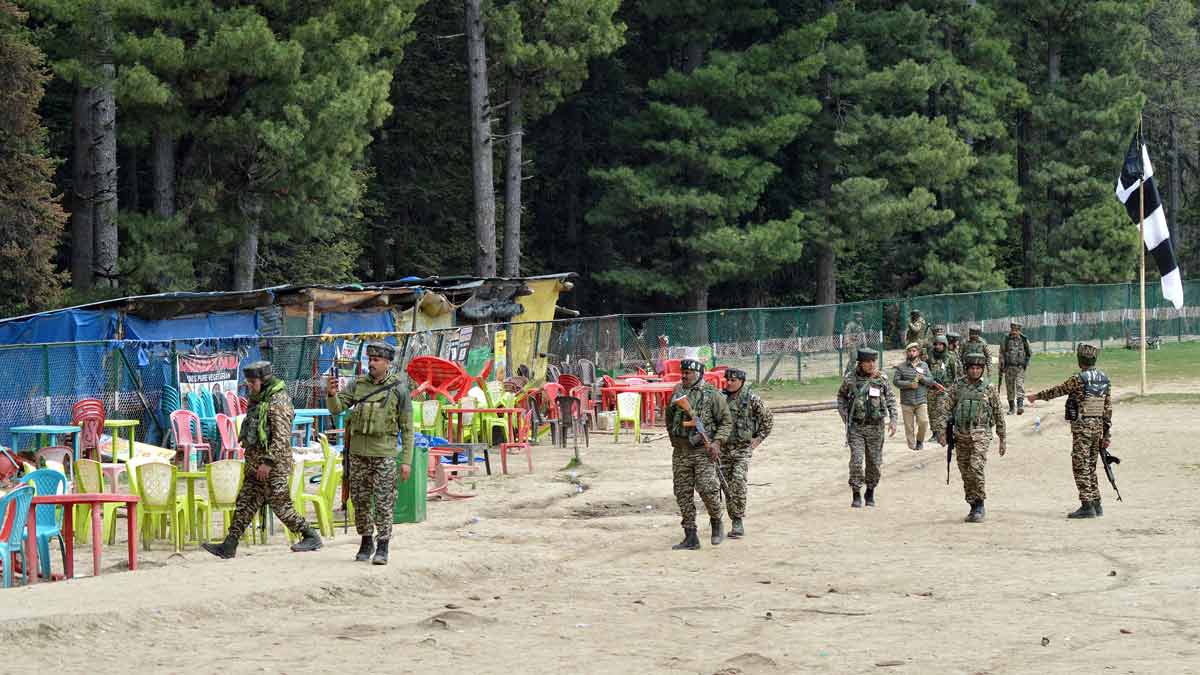Pahalgam terror attack: How a four-pronged strategy is shaping India’s retaliation against Pakistan
 Security personnel patrol the site of the terrorist attack on tourists in Baisaran near Pahalgam in south Kashmir's Anantnag district | Reuters
Security personnel patrol the site of the terrorist attack on tourists in Baisaran near Pahalgam in south Kashmir's Anantnag district | Reuters
The Union government’s counter-terror measures to strike at the terror ecosystem in Pakistan that spilt blood in Pahalgam includes a four-pronged strategy. As a first step, the local aides to terrorists are being identified and targeted, their houses being razed to the ground – a move that is being executed with careful understanding of the local sentiment, that can blend organically with the loud calls for unity in action both within and outside the Valley in condemning and rejecting the terror ecosystem – a key element in the success of any counter-terror strategy.
The second step is the build-up happening on the Line of Control with Pakistan with ceasefire violations in the form of unprovoked firing being reported from Pakistan side and retaliation by the Indian armed forces. For the fourth straight night, Pakistani troops resorted to unprovoked small arms firing in areas opposite Kupwara and Poonch, and the Indian Army responded swiftly.
The Indian armed forces are keeping the Pakistani troops engaged, testing mettle and remaining prepared for challenges that can come with more open and continuous firing, something that cannot be ruled out at the moment, sources said.
For security forces, the firing incidents on the border, throws open an opportunity to keep the Pakistani forces engaged on the borders, while counter-terror operations are being strategised behind closed doors by Indian intelligence and counter terror agencies.
Security sources said the need of the hour is to identify and isolate the Non-State actors like the ideologues and top brass of terror outfits like the Lashkar-e-Taiba, Jaish-e-Mohammed in Pakistan, who are using smaller outfits and foot soldiers to carry out proxy wars within J&K.
The timelines of such response will be explored by the central technical and intelligence wings along with the top brass of the Indian armed forces. During the Balakot airstrike in 2019, Indian agencies had in their possession a dossier on how Pakistani authorities were aware of the terror training camp that was being allowed to flourish, till it was razed to the ground in the counter-terror strike. The local authorities in Pakistan had created a database of 42 Jaish cadres, including senior members and operatives who were imparting training to terrorists at the camp in Balakot. The technical evidence included inspirational lectures delivered by Masood Azhar and other terrorist leaders on several occasions at the hilltop facility situated on Kunhar river. National Security Advisor Ajit Doval was briefed by Indian agencies how Masood Azhar's relatives, including Yusuf Azhar alias Ustad Ghauri - the suspected mastermind of the Pulwama attack - had been trained at Balakot in advanced weapons and tactics.
Before the JeM, the camp had been used by Hizb-ul-Mujahideen, which showed the cross-pollination between terrorist outfits.
The LeT’s proxies are at work this time and once again there is focus on gathering technical and human intelligence on the terror operatives and their ideologues operating in camps across the border. Whether it is targeted strikes on key terror operatives or a strike on larger terror camps of footsoldiers - are operational decisions, sources said, adding that the aim is to go to the root of the problem.
This time, the counter-terror action is being bolstered by the third step – where a civil society outreach is being made by the government to unite people against terror. Whether it is the prime minister’s Mann ki Baat or small processions at the local level in states to stand in solidarity with the Pahalgam martyrs and victims, the attempt is to ensure that the integration of J&K is complete and the entire nation defeats the terrorists who spilled blood in Pahalgam.
The fourth step is international support, with India’s diplomatic offensive already in works exposing Pakistan’s role in the Pahalgam attack. The direction is clear, senior security officials said, that the terror ecosystem is the target and the long-term success of a counter-terror offensive depends on the success of the multi-pronged strategy.
India